
Cast * Interesting Facts * The Sex in The Lion King! * The Broadway Show * The IMAX Re-release

Cast * Interesting Facts * The Sex in The Lion King! * The Broadway Show * The IMAX Re-release
Directed by: Roger Allers & Rob Minkoff
Written by: Jim Capobianco & Irene Mecchi
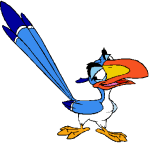 Music
by: Hans Zimmer, Elton John & Tim Rice
Music
by: Hans Zimmer, Elton John & Tim Rice
Released on: June 24, 1994
Running Time: 84 minutes
Budget: $40 million
Box-Office: $313 million in the U.S. (plus $15.68 million from
its Imax re-release in December 2002), $783.4 million worldwide
Rentals: $173,057,000 in the U.S., $531,722,000 worldwide
Note: The movie was released twice in the US, once on June 24,
1994, and again on November 18, 1994. From those two running times it reached
the fifth sport on the list of high-earning films of all time (after E.T.,
Jurassic Park, Forrest Gump, and Star Wars). Since
then, it has been bumped off the top 7 by Titanic and The Phantome
Menace.
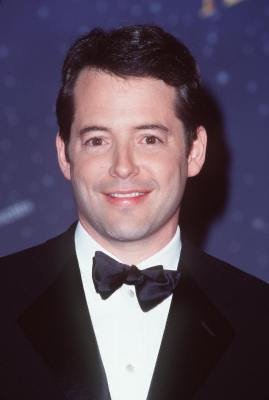 |
 |
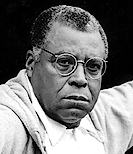 |
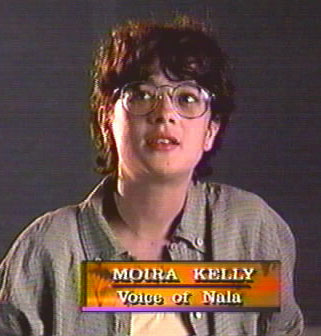 |
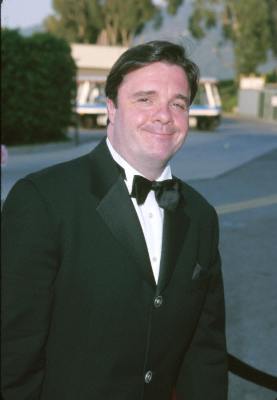 |
|
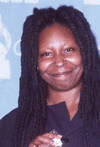 |
 |
Young Simba... Jonathan Taylor Thomas
Adult Simba... Matthew Broderick
Mufasa... James Earl Jones
Scar... Jeremy Irons
Timon... Nathan Lane
Pumbaa... Ernie Sabella
Young Nala... Niketa Calame
Adult Nala... Moira Kelly
Rafiki... Robert Guillaume
Zazu... Rowan Atkinson
Shenzi... Whoopi Goldberg
Banzai... Cheech Marin
Ed... Jim Cummings
"I think the character of Simba is a lot like me," said Jonathan Taylor Thomas (Young Simba). "He's real energetic and always looking around for a new adventure. I think I have a lot of that in me."
"It's a real honor to be in a Disney animated film," says Matthew Broderick (Adult Simba). "I grew up with them and have loved them ever since I saw Snow White when I was a kid. I though The Lion King was a great story and it was fascinating to collaborate with the directors and animators and to see it evolve. Instead of sending you a script, they take you into a big room and show you pictures as they talk you through the story with a pointer. Doing a voice for Disney is incredibly precise and, from my point of view, it seemed to be much more about making it perfect. With live-action movies, you're always compromising and never seem to have enough time. On this film, they were able to re-do things until they got it just the way they wanted it. As an actor, I took my part very seriously and gave it everything I had. The only real difference was I didn't have to worry about how I looked."
"It's very liberating to play an animated character," observes Jeremy Irons (Scar). "It doesn't matter what messages my face sends during the recording since it's not being done to camera. This allows me to really go to extremes and play wildly with the glee and Machiavelian quality and deceit of the character. I try to put as much color as I can into just one thing--my voice. Hopefully this gives the animators the inspiration they need to draw the character. Scar is the first out-and-out villain that I've ever played. He's the baddie and a very hammy one at that. I think we all like a good villain who's sort of witty and slimy and seductive. He has many layers and lots of tricks. He's not unlike Iago in Othello in that he's a very charming villain, although structurally he's much more like Claudius in Hamlet. When I first saw what Andrews [Deja] had done with the animation of Scar, I was very, very thrilled. I felt that he had caught all the wickedness and humor and I was amazed how well he had understood and enlarged upon the sounds that I made when I recorded it. He really created the most extraordinary character and it helped me to feel the character better than I had before."
"James Earl Jones was perfect for the part [of Mufasa]," says
supervising animator Tony Fucile. "I can't even imagine anyone else doing
the voice. He adds the regal quality that we needed and, on top of that,
he's got this fatherly warmth that comes across. It was up to us to visually
come up to that standard that he set with his voice. Watching his performance
in the film Matewan was really helpful because he used a lot of
facial expressions and eye movements to communicate. Mufasa's animation
is very subtle and there are times where he doesn't move but says a lot
with just a stare. Each drawing has to say a lot and have a strong attitude."
Co-director Roger Allers adds that James Earl Jones "has this incredibly
huge and masterful voice that just resonated throughout the recording studio.
Even without a microphone, it just filled the entire room." Co-director
Rob Minkoff concludes, "He really sounds like a lion. During the recording
sessions, we used sixz microphones strategically placed all around his
head so that the voice would surround you and sound like it was coming
from everywhere."
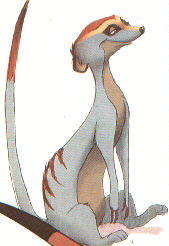 |
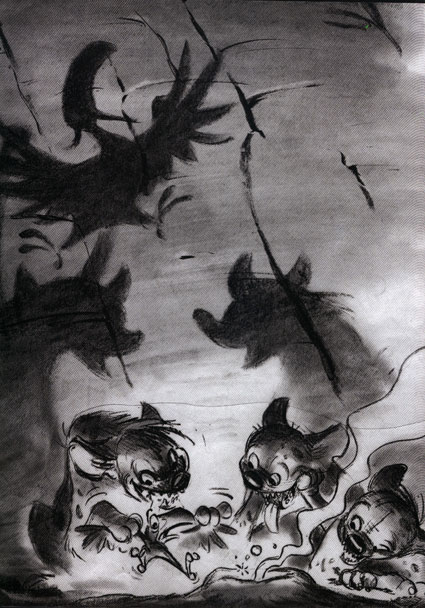 |
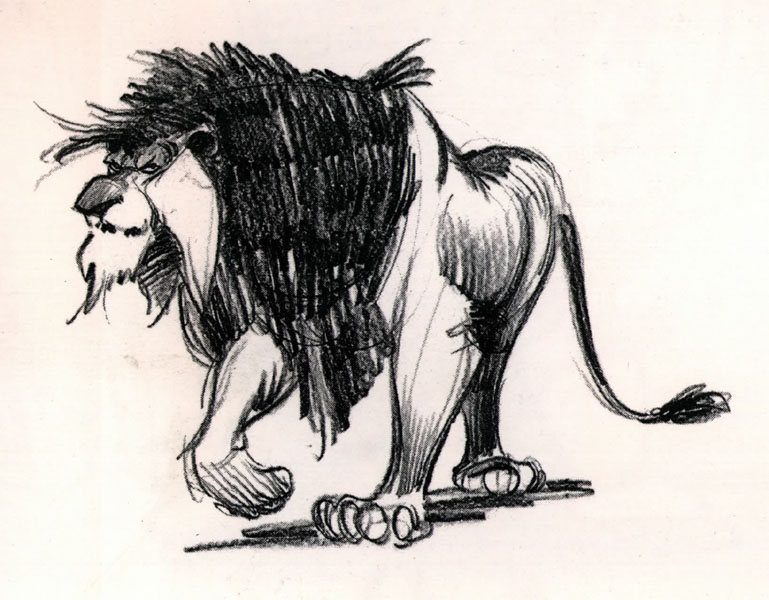 |
![]() During The
Lion King's first phase of development, the project (which was then
called King of the Jungle with Meryl Streep attached to voice one
of the main characters) showed such little promise that Disney had trouble
convincing its top animators to work on the production. Most of Disney's
top toon talent opted instead to work on Pocahontas,
which -at the time- appeared to be the stronger of the two films.
Director Roger Allers spent months straightening out The Lion King's
problematic script. Characters were tossed out. Whole scenes and storylines
fell by the wayside, as Roger did whatever he had to to pull a compelling
plot out of the movie's muddled storyline.
During The
Lion King's first phase of development, the project (which was then
called King of the Jungle with Meryl Streep attached to voice one
of the main characters) showed such little promise that Disney had trouble
convincing its top animators to work on the production. Most of Disney's
top toon talent opted instead to work on Pocahontas,
which -at the time- appeared to be the stronger of the two films.
Director Roger Allers spent months straightening out The Lion King's
problematic script. Characters were tossed out. Whole scenes and storylines
fell by the wayside, as Roger did whatever he had to to pull a compelling
plot out of the movie's muddled storyline.
![]() Simba's eye color
changed to white during the nighttime scenes, since the yellow eyes combined
with the dark blue night colors "made Simba look jaundiced" and that the
directors "didn't think anyone would notice" the changing eye color.
Simba's eye color
changed to white during the nighttime scenes, since the yellow eyes combined
with the dark blue night colors "made Simba look jaundiced" and that the
directors "didn't think anyone would notice" the changing eye color.
![]() Producer Don Hahn
recalled in a June 2001 interview that "at the studio, nobody wanted to
work on The Lion King--everybody wanted to work on other movies
because it was this little African story about a guy who gets framed for
the murder of his father, Elton John is writing songs, what the hell is
this!" He reinforced in March 2003 that "Lion King was a movie no
one wanted to work on. Everyone wanted to work on Pocahontas
or other movies coming out because the early development was like a nature
documentary. It seemed sort of dry--Bambi in Africa everybody used
to call it. We used to wander around trying to find people who wanted to
work on it. That was a combination of trying to step out in a new direction
musically with Elton and Tim, and also a new director. I feel like Rob
Minkoff is a very strong director, as is Roger Allers, and I feel like
again, their approach to that movie plus the topic of Africa plus the story
that was very mythological, very 'Hero’s Journey', very Moses and Joseph--we
used to call it 'Moses Meets Joseph and Elton John in Africa'. All those
things put together made for something the audience responded to." Asked
why the movie took off so strongly, Don Hahn responds: "I have no idea!
(laughs) Here are all the arguments, and you can decide what the answer
is. On one hand, the craft was great--the music was great, the animation
was great. But also it was in a summer when it was the only animated movie
that whole summer. Now you look at a typical summer and there may be four
or five animated movies plus live-action movies like Harry Potter
that vie for a family audience. That summer was Forrest Gump and
Lion
King, so the movie could run and run and run and run. And it was a
good movie. I feel like the story, the idea of a person who’s lost their
father and tries to live on with his spirit without taking responsibility
for all those things strikes a chord in people that’s very emotional."
Producer Don Hahn
recalled in a June 2001 interview that "at the studio, nobody wanted to
work on The Lion King--everybody wanted to work on other movies
because it was this little African story about a guy who gets framed for
the murder of his father, Elton John is writing songs, what the hell is
this!" He reinforced in March 2003 that "Lion King was a movie no
one wanted to work on. Everyone wanted to work on Pocahontas
or other movies coming out because the early development was like a nature
documentary. It seemed sort of dry--Bambi in Africa everybody used
to call it. We used to wander around trying to find people who wanted to
work on it. That was a combination of trying to step out in a new direction
musically with Elton and Tim, and also a new director. I feel like Rob
Minkoff is a very strong director, as is Roger Allers, and I feel like
again, their approach to that movie plus the topic of Africa plus the story
that was very mythological, very 'Hero’s Journey', very Moses and Joseph--we
used to call it 'Moses Meets Joseph and Elton John in Africa'. All those
things put together made for something the audience responded to." Asked
why the movie took off so strongly, Don Hahn responds: "I have no idea!
(laughs) Here are all the arguments, and you can decide what the answer
is. On one hand, the craft was great--the music was great, the animation
was great. But also it was in a summer when it was the only animated movie
that whole summer. Now you look at a typical summer and there may be four
or five animated movies plus live-action movies like Harry Potter
that vie for a family audience. That summer was Forrest Gump and
Lion
King, so the movie could run and run and run and run. And it was a
good movie. I feel like the story, the idea of a person who’s lost their
father and tries to live on with his spirit without taking responsibility
for all those things strikes a chord in people that’s very emotional."
![]() Jeffrey Katzenberg
was terribly sure that Lion King was going to fail. So sure he was
required to get down on his knees in front of the crew and apologize after
the movie's opening!
Jeffrey Katzenberg
was terribly sure that Lion King was going to fail. So sure he was
required to get down on his knees in front of the crew and apologize after
the movie's opening!
![]() Don Hahn further
recalled in August 2003 that "no one could have imagined that this coming-of-age
story would amount to much. In the early days of production, I had trouble
getting people to work on the film. At times when The Lion King
was at full throttle, we started to wonder what we had done or if anyone
would see it. I remember calling my sister and telling her I was working
on a film--'sort of Moses and Joseph meet Elton John and Hamlet in Africa.'
There was a very long pause on the other end of the line. Then she said,
'Well, I hope it works out.' And it did."
Don Hahn further
recalled in August 2003 that "no one could have imagined that this coming-of-age
story would amount to much. In the early days of production, I had trouble
getting people to work on the film. At times when The Lion King
was at full throttle, we started to wonder what we had done or if anyone
would see it. I remember calling my sister and telling her I was working
on a film--'sort of Moses and Joseph meet Elton John and Hamlet in Africa.'
There was a very long pause on the other end of the line. Then she said,
'Well, I hope it works out.' And it did."
 |
 |
 |
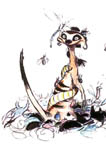 |
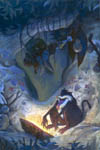 |
 |
![]() Nathan Lane and
Ernie Sabella originally auditioned individually for the parts of the hyenas.
The directors quickly dismissed both of them saying they weren't right
for the parts. Afterwards, Nathan & Ernie (who were already good
friends) found out that each other had auditioned and both been turned
down. They decided to try again, but as a pair, and read a scene
for the directors together. The reluctant directors finally agreed
to hear these two again for the parts of the hyenas. But during the
reading, the directors realized that these two guys had great comedic timing
together and decided that they still weren't right for the hyenas, but
would be perfect for Timon & Pumbaa.
Nathan Lane and
Ernie Sabella originally auditioned individually for the parts of the hyenas.
The directors quickly dismissed both of them saying they weren't right
for the parts. Afterwards, Nathan & Ernie (who were already good
friends) found out that each other had auditioned and both been turned
down. They decided to try again, but as a pair, and read a scene
for the directors together. The reluctant directors finally agreed
to hear these two again for the parts of the hyenas. But during the
reading, the directors realized that these two guys had great comedic timing
together and decided that they still weren't right for the hyenas, but
would be perfect for Timon & Pumbaa.
![]() Two scenes got
past the brainstorming, and storyboards, but didn't arrive in the film:
the Warthog Rhapsody scene and song, and the scene after Simba has gone
home and Timon argues whether he should bother going to help him. This
was cut out to keep Timon's character as lovable as possible.
Two scenes got
past the brainstorming, and storyboards, but didn't arrive in the film:
the Warthog Rhapsody scene and song, and the scene after Simba has gone
home and Timon argues whether he should bother going to help him. This
was cut out to keep Timon's character as lovable as possible.
![]() In the movie's
early stage of development, baby Simba was scared when he first saw Rafiki,
and hissed at him. But the directors decided to take out the scare/hiss
because they wanted the opening to be completely free of character dialogue/sounds.
In the movie's
early stage of development, baby Simba was scared when he first saw Rafiki,
and hissed at him. But the directors decided to take out the scare/hiss
because they wanted the opening to be completely free of character dialogue/sounds.
![]() The "Big Boom"
that occurs after the title is shown was not added until late in the production.
The directors said during a school presentation that the original version
of "Circle of Life" that Elton John wrote for the film was extremely twangy
and sounded "like a hoedown" and they had him rewrite it entirely.
The "Big Boom"
that occurs after the title is shown was not added until late in the production.
The directors said during a school presentation that the original version
of "Circle of Life" that Elton John wrote for the film was extremely twangy
and sounded "like a hoedown" and they had him rewrite it entirely.
![]() Some tiny birds
in the movie were used directly from Bambi's
animation.
Some tiny birds
in the movie were used directly from Bambi's
animation.
![]() Producer Don Hahn
explains that "it was about the third movie in a string of movies that
was produced digitally with hand drawn drawings, then the drawings were
scanned into a scanner, a big massive, expensive scanner. The backgrounds,
the same way, they're painted by hand with a paintbrush, scanned in and
then they're composited with the characters and other levels of clouds,
effects and details. The only area of the movie that was digitally animated
was, of course, the wildebeest stampede."
Producer Don Hahn
explains that "it was about the third movie in a string of movies that
was produced digitally with hand drawn drawings, then the drawings were
scanned into a scanner, a big massive, expensive scanner. The backgrounds,
the same way, they're painted by hand with a paintbrush, scanned in and
then they're composited with the characters and other levels of clouds,
effects and details. The only area of the movie that was digitally animated
was, of course, the wildebeest stampede."
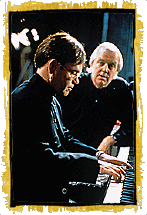
![]() Out of the 5 songs nominated for an Academy Awards at the 1994 ceremony,
three were from The Lion King: "Hakuna Matata", "Can You Feel The
Love Tonight" and "Circle of Life"!
Out of the 5 songs nominated for an Academy Awards at the 1994 ceremony,
three were from The Lion King: "Hakuna Matata", "Can You Feel The
Love Tonight" and "Circle of Life"!
![]() The Academy-Award
winning "Can you feel the love tonight" was initially rejected by producers
who thought it unnecessarily slowed down the movie. Elton John insisted
that it be included in the final version of The Lion King, since
he could not conceive the movie without what he thought was its best melody
-and only love song. A scene was therefore developed to fit it in!
The Academy-Award
winning "Can you feel the love tonight" was initially rejected by producers
who thought it unnecessarily slowed down the movie. Elton John insisted
that it be included in the final version of The Lion King, since
he could not conceive the movie without what he thought was its best melody
-and only love song. A scene was therefore developed to fit it in!
![]() "I create these
fantastic scores in my head, but it goes downhill from there," German composer
Hans Zimmer admits, explaining that the perfectionist in him is never quite
satisfied with the finished product. "Ultimately I just want to sit
down and write a good tune. I try to create something that comes from the
heart and moves people — something emotional, not sentimental."
"I create these
fantastic scores in my head, but it goes downhill from there," German composer
Hans Zimmer admits, explaining that the perfectionist in him is never quite
satisfied with the finished product. "Ultimately I just want to sit
down and write a good tune. I try to create something that comes from the
heart and moves people — something emotional, not sentimental."
![]() Early promos for
the movie promised seven original John/Rice songs, not five. One which
was cut, "Warthog Rhapsody," has been released on the sequel "Rhythm of
the Pride Lands" CD. As to the other: Mufasa was to sing a song entitled
"To Be King," which was supposed to be geared toward teaching Simba what
it means to have the responsibility of kingship. It was cut, presumably
because they just couldn't think of a way for James Earl Jones to SING
without sounding ridiculous...
Early promos for
the movie promised seven original John/Rice songs, not five. One which
was cut, "Warthog Rhapsody," has been released on the sequel "Rhythm of
the Pride Lands" CD. As to the other: Mufasa was to sing a song entitled
"To Be King," which was supposed to be geared toward teaching Simba what
it means to have the responsibility of kingship. It was cut, presumably
because they just couldn't think of a way for James Earl Jones to SING
without sounding ridiculous...
![]() Test previews
went extremely well, and producer Don Hahn recalls that "you'd come out
and the audience was buzzing about it and feels like they had seen something
special and were really involved in the characters."
Test previews
went extremely well, and producer Don Hahn recalls that "you'd come out
and the audience was buzzing about it and feels like they had seen something
special and were really involved in the characters."
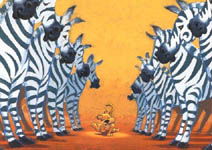 |
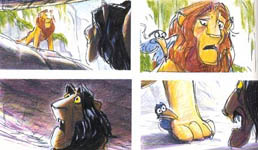 |
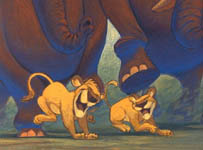 |
![]() On its first weekend,
The
Lion King grossed US $41 million, a record for an animated film. The
movie then went on to earn $340 million from video sales, selling more
than 20 million copies in its first week of release in February 1995, breaking
all industry records.
On its first weekend,
The
Lion King grossed US $41 million, a record for an animated film. The
movie then went on to earn $340 million from video sales, selling more
than 20 million copies in its first week of release in February 1995, breaking
all industry records.
![]() This would be
the last animated feature to be released during Jeffrey Katzenberg's extremely
successful tenure as chairman of Walt Disney Studios. Shortly after
the film passed the $250 million mark in domestic rentals--and 10 years
after he joined the Disney team--Katzenberg left the Studio, apparently
unhappy at no being appointed president of The Walt Disney Company in the
wake of Frank Wells' tragic death in a helicopter accident earlier in 1994.
This would be
the last animated feature to be released during Jeffrey Katzenberg's extremely
successful tenure as chairman of Walt Disney Studios. Shortly after
the film passed the $250 million mark in domestic rentals--and 10 years
after he joined the Disney team--Katzenberg left the Studio, apparently
unhappy at no being appointed president of The Walt Disney Company in the
wake of Frank Wells' tragic death in a helicopter accident earlier in 1994.
![]() Animation legend
Don
Bluth commented in a 2003 online post that "Lion King's success
maybe goes to the storyboard artists. We have heard that the script was
worked to death and that the story department at Disney convinced Mr. Katzenberg
to give them a shot at working out the story. He did and the movie is the
result. Discoveries are made in the storyboarding process, especially about
which characters are the strongest and whether or not to include them more
than they might be in the script."
Animation legend
Don
Bluth commented in a 2003 online post that "Lion King's success
maybe goes to the storyboard artists. We have heard that the script was
worked to death and that the story department at Disney convinced Mr. Katzenberg
to give them a shot at working out the story. He did and the movie is the
result. Discoveries are made in the storyboarding process, especially about
which characters are the strongest and whether or not to include them more
than they might be in the script."
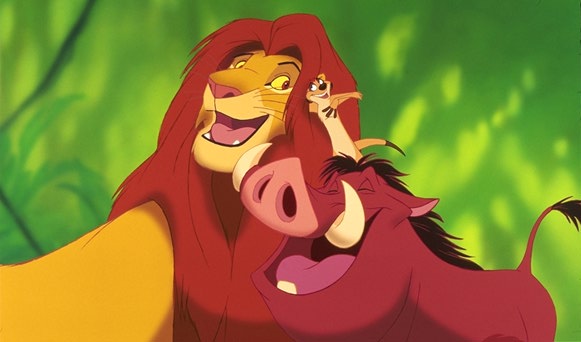
![]() Scar says "You have no idea" to Young Simba. This line comes from "Reversal
of Fortune" and was spoken by the Claus von Bulow character in that movie.
CvB was played by Jeremy Irons, who also voice Scar in TLK. (Irons won
an Oscar for his CvB role, BTW).
Scar says "You have no idea" to Young Simba. This line comes from "Reversal
of Fortune" and was spoken by the Claus von Bulow character in that movie.
CvB was played by Jeremy Irons, who also voice Scar in TLK. (Irons won
an Oscar for his CvB role, BTW).
![]() "Hakuna Matata",
the motto of Timon and Pumbaa, means nearly what they claim it to mean:
literally translated, it is "There are no concerns here." The words have
an implication of location as well as of the concerns involved. However,
the stresses should be on the first syllable of each word rather than the
second.
"Hakuna Matata",
the motto of Timon and Pumbaa, means nearly what they claim it to mean:
literally translated, it is "There are no concerns here." The words have
an implication of location as well as of the concerns involved. However,
the stresses should be on the first syllable of each word rather than the
second.
![]() Elton John revealed
that his song "Can You Feel the Love Tonight" was to be originally sung
by Timon and Pumbaa, but it was so horrible, he offered other suggestions,
which led to the song being performed by Simba.
Elton John revealed
that his song "Can You Feel the Love Tonight" was to be originally sung
by Timon and Pumbaa, but it was so horrible, he offered other suggestions,
which led to the song being performed by Simba.
![]() Many of the characters'
names are in Swahili:
Many of the characters'
names are in Swahili:
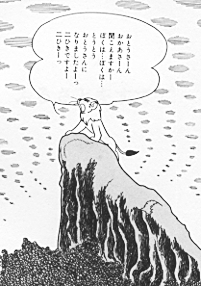
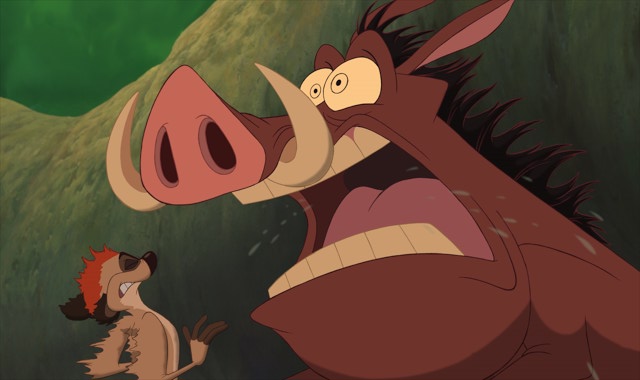
![]() Disney makes no secret of the fact that TLK is very similar to Shakespeare's
"Hamlet" in a large number of instances. Some parallels include:
Disney makes no secret of the fact that TLK is very similar to Shakespeare's
"Hamlet" in a large number of instances. Some parallels include:
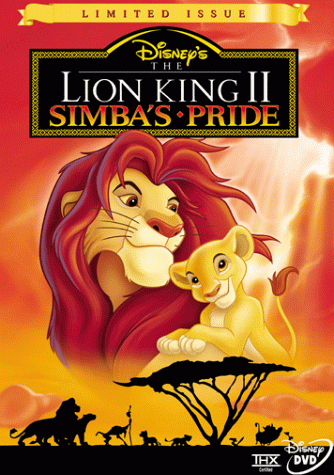
![]() A direct-to-video sequel, The Lion King II: Simba's Pride -in which
majestic jungle king Simba prepares his daughter, now of age, for the throne-
was released in October 1998. Featuring the voice talents of returning
stars Matthew Broderick, James Earl Jones and Nathan Lane, as well as newcomers
Neve Campbell, Lacey Chabert and Moira Kelly, it went on to become the
biggest video opening ever with 3.5 million copies sold in its first three
days, and receveid an Annie Award for Outstanding Achievement in an Animated
Home Video Production. It went on to sell more than 15 million copies.
Consumers spent about $300 million on The Lion King II, more than
the box office receipts from any animated theatrical release in history
except one, the $313 million of the original The Lion King in 1994.
A direct-to-video sequel, The Lion King II: Simba's Pride -in which
majestic jungle king Simba prepares his daughter, now of age, for the throne-
was released in October 1998. Featuring the voice talents of returning
stars Matthew Broderick, James Earl Jones and Nathan Lane, as well as newcomers
Neve Campbell, Lacey Chabert and Moira Kelly, it went on to become the
biggest video opening ever with 3.5 million copies sold in its first three
days, and receveid an Annie Award for Outstanding Achievement in an Animated
Home Video Production. It went on to sell more than 15 million copies.
Consumers spent about $300 million on The Lion King II, more than
the box office receipts from any animated theatrical release in history
except one, the $313 million of the original The Lion King in 1994.
![]() In April 2000,
Walt Disney picked scribes Jeff Ahlholm and Colin Goldman to write the
script for Lion King 3, a direct-to-video production. According
to Variety, Tom Rogers will also be contributing to the film's script.
Plans were to complete production on the pic in time to hit video stores
sometime in 2001, but had to be delayed by at least 2 years. Tentatively
titled Hakuna Matata then The Lion King One and a Half, this
direct-to-video release will tell the story of how Timon and Pumbaa got
together. Ernie Sabella (the voice of Pumbaa) revealed in June 2002 that
that the writers were now the same as those from the first film [Irene
Mecchi, Jonathan Roberts and Linda Woolverton] and that the original cast
would be providing the voices once again. Jim Hill further hinted
in March 2003 that contrary to rumors, the mid-quel would would hit store
shelves--not theaters--later in the Fall of that same year, adding that
"I have been hearing that [Walt Disney Television Animation Australia]
did a really nice job with Lion King III."
In April 2000,
Walt Disney picked scribes Jeff Ahlholm and Colin Goldman to write the
script for Lion King 3, a direct-to-video production. According
to Variety, Tom Rogers will also be contributing to the film's script.
Plans were to complete production on the pic in time to hit video stores
sometime in 2001, but had to be delayed by at least 2 years. Tentatively
titled Hakuna Matata then The Lion King One and a Half, this
direct-to-video release will tell the story of how Timon and Pumbaa got
together. Ernie Sabella (the voice of Pumbaa) revealed in June 2002 that
that the writers were now the same as those from the first film [Irene
Mecchi, Jonathan Roberts and Linda Woolverton] and that the original cast
would be providing the voices once again. Jim Hill further hinted
in March 2003 that contrary to rumors, the mid-quel would would hit store
shelves--not theaters--later in the Fall of that same year, adding that
"I have been hearing that [Walt Disney Television Animation Australia]
did a really nice job with Lion King III."
![]() The Hollywood
Reporter officially announced in May 2003 that the The Lion King 1 1/2,
due in early spring 2004, would offer an "irreverent, edgy, humorous back
story" to the original told from the perspectives of characters Timon and
Pumba, who are again voiced by Nathan Lane and Ernie Sabella, respectively.
Matthew Broderick reprises his role as Simba, while Elton John and Tim
Rice return with the new song "Meerkat Rhapsody." Disney has high hopes
for Lion King 1 1/2, which will not carry a subtitle in the fashion
of The Lion King II: Simba's Pride. The original
Lion King
will be out in a first-ever Disney DVD two-disc set October 7, 2003 followedby
Lion
King 1 1/2 and then a special-edition DVD version of Simba's Pride
in fall 2004. Slipping the video premiere of Lion King 1 1/2 between
the Lion King and Simba's Pride rerelease "reflects a philosophy
that the property is bigger than any one channel" of release, said Robert
Chapek, president of Disney's Buena Vista Home Entertainment unit. Lion
King 1 1/2 will be marketed to the broadest possible audience, from
"anyone who bought the original Lion King plus anyone who's come
into the marketplace since then," Chapek said.
The Hollywood
Reporter officially announced in May 2003 that the The Lion King 1 1/2,
due in early spring 2004, would offer an "irreverent, edgy, humorous back
story" to the original told from the perspectives of characters Timon and
Pumba, who are again voiced by Nathan Lane and Ernie Sabella, respectively.
Matthew Broderick reprises his role as Simba, while Elton John and Tim
Rice return with the new song "Meerkat Rhapsody." Disney has high hopes
for Lion King 1 1/2, which will not carry a subtitle in the fashion
of The Lion King II: Simba's Pride. The original
Lion King
will be out in a first-ever Disney DVD two-disc set October 7, 2003 followedby
Lion
King 1 1/2 and then a special-edition DVD version of Simba's Pride
in fall 2004. Slipping the video premiere of Lion King 1 1/2 between
the Lion King and Simba's Pride rerelease "reflects a philosophy
that the property is bigger than any one channel" of release, said Robert
Chapek, president of Disney's Buena Vista Home Entertainment unit. Lion
King 1 1/2 will be marketed to the broadest possible audience, from
"anyone who bought the original Lion King plus anyone who's come
into the marketplace since then," Chapek said.
![]() An IMAX version
of The Lion King was released on December 25, 2002. The original
announcement came after a private screening of the Imax version of Beauty
and the Beast at the Regal Theatre in Lincolnshire, IL in November
2001. Touch-ups for this special edition consist mostly of filling in details
that otherwise wouldn't have been visible--characters who were originally
too small to have faces drawn in, for instance. Producer Don Hahn explained
that "we debated [adding new scenes]. Essentially, we decided to leave
it alone. We said, let's just do the restoration." Co-director Rob
Minkoff added that The Lion King has been "enhanced visually and
in the sound, too... it really surrounds you and almost puts you on the
African plain with the lions." The original movie remains the highest grossing
animated film of all time, with $771 million in global ticket sales, the
video has sold over 30 million copies in the U.S. The stage show has generated
over $900 million in global ticket sales. Rob Minkoff said he never dreamed
the movie would become so successful and believes its messages of hope
and taking responsibility appeal to people of all ages. "There is a whole
new group of kids who never saw the movie in the theater, and people who
saw it as teens have had kids," Minkoff added. "To see it on Imax is an
entirely new way."
An IMAX version
of The Lion King was released on December 25, 2002. The original
announcement came after a private screening of the Imax version of Beauty
and the Beast at the Regal Theatre in Lincolnshire, IL in November
2001. Touch-ups for this special edition consist mostly of filling in details
that otherwise wouldn't have been visible--characters who were originally
too small to have faces drawn in, for instance. Producer Don Hahn explained
that "we debated [adding new scenes]. Essentially, we decided to leave
it alone. We said, let's just do the restoration." Co-director Rob
Minkoff added that The Lion King has been "enhanced visually and
in the sound, too... it really surrounds you and almost puts you on the
African plain with the lions." The original movie remains the highest grossing
animated film of all time, with $771 million in global ticket sales, the
video has sold over 30 million copies in the U.S. The stage show has generated
over $900 million in global ticket sales. Rob Minkoff said he never dreamed
the movie would become so successful and believes its messages of hope
and taking responsibility appeal to people of all ages. "There is a whole
new group of kids who never saw the movie in the theater, and people who
saw it as teens have had kids," Minkoff added. "To see it on Imax is an
entirely new way."
![]() Eager to capitalize
on the film's success, Disney has produced a wealth of tie-in products
for the film, shooting documentary footage in Africa and an interview with
soundtrack composer Elton John for inclusion in a DVD release on October
7, 2003. "The list [of DVD extras] is a mile long," producer Don Hahn revealed
in December 2002, before confirming that the next Disney animated hit to
get the Imax then DVD Platinum Edition treatment would be Aladdin.
Eager to capitalize
on the film's success, Disney has produced a wealth of tie-in products
for the film, shooting documentary footage in Africa and an interview with
soundtrack composer Elton John for inclusion in a DVD release on October
7, 2003. "The list [of DVD extras] is a mile long," producer Don Hahn revealed
in December 2002, before confirming that the next Disney animated hit to
get the Imax then DVD Platinum Edition treatment would be Aladdin.
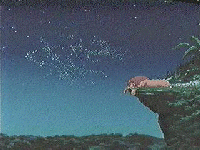 A
4-year-old American boy, viewing the video with his head tilted to the
left, supposedly noticed the appearance of the letters S-E-X in a scene
where Simba, Pumbaa and Timon are lying on their backs, looking up at the
stars. He told his mother about it -how a mere 4-year-old could both spell
and understand the significance of the word "sex" remains unexplained!
She in turn notified a religious organization called the American Life
League, who claimed this was yet another occurrence of Disney's deliberately
inserting hidden images into their animated films. The American Life League,
which had already been boycotting Disney films since the previous April,
made this rumor the highlight of their September 1995 publicity campaign
against several Disney videos allegedly containing "sexual messages."
A
4-year-old American boy, viewing the video with his head tilted to the
left, supposedly noticed the appearance of the letters S-E-X in a scene
where Simba, Pumbaa and Timon are lying on their backs, looking up at the
stars. He told his mother about it -how a mere 4-year-old could both spell
and understand the significance of the word "sex" remains unexplained!
She in turn notified a religious organization called the American Life
League, who claimed this was yet another occurrence of Disney's deliberately
inserting hidden images into their animated films. The American Life League,
which had already been boycotting Disney films since the previous April,
made this rumor the highlight of their September 1995 publicity campaign
against several Disney videos allegedly containing "sexual messages."
Insiders argue that the sign in the sky actually spells out 'SFX'
and was put in there intentionally by the Special FX team.
Julie Taymor, a director known primarily for her work in the avant-garde theatre, was the mastermind behind the Broadway production. She not only directed the show, but also designed the costumes, collaborated with Michael Curry on the design of the masks and puppets, and contributed additional music and lyrics to the original score by Elton John and Tim Rice.
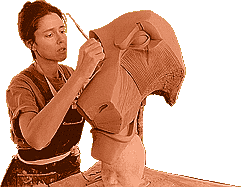 Taymor's
first challenge was to determine how she should approach a story that is
all about animals, but is in essence a human story. She eventually decided
to accentuate this duality between the human and the animal by combining
masks and puppetry with live actors. She created giant masks that would
represent characters such as Scar and Mufasa, but left the human face revealed
below the mask so that the actors' facial expressions would not be lost.
Taymor's
first challenge was to determine how she should approach a story that is
all about animals, but is in essence a human story. She eventually decided
to accentuate this duality between the human and the animal by combining
masks and puppetry with live actors. She created giant masks that would
represent characters such as Scar and Mufasa, but left the human face revealed
below the mask so that the actors' facial expressions would not be lost.
Taymor's next hurdle was finding a way to convey the atmosphere of The Lion King in a live theatre. Determined not to tone down the scale of the film, she wanted to bring to the stage such vast and sweeping elements as the rolling African Savannah and the famous wildebeest stampede in which Mufasa is killed by his brother Scar. She succeeded in reproducing these grand effects through the use of ingenious impressionistic staging techniques. For the wildebeest scene, she created a false perspective of great distance by placing five earth-colored portals one behind the other. She then used a canvas scroll and a series of large rollers to create the illusion of thousands of racing animals. The effect in the theatre is electrifying as thousands of wildebeests seem to be rushing straight at Simba--and at the audience!
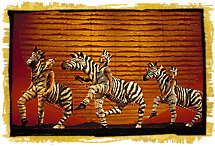 The
animated film on which the musical is based on five songs by composer Elton
John and lyricist Tim Rice including such hits as "The Circle of Life,"
"Can You Feel the Love Tonight," and "Hakuna Matata." In addition, the
duo wrote three new songs for the musical: Zazu's "The Morning Report,"
the hyenas' "Chow Down," and "The Madness of King Scar" in which the musical
style mutates along with the escalating schizophrenia of Scar. However,
the stage version still needed more songs to fully explore Simba's journey,
so the creative team turned to The Rhythm of the Pride Lands, a
recording inspired by the film featuring songs by South African songwriter
Lebo M, Mark Mancina, Jay Rifkin and Hans Zimmer.
The
animated film on which the musical is based on five songs by composer Elton
John and lyricist Tim Rice including such hits as "The Circle of Life,"
"Can You Feel the Love Tonight," and "Hakuna Matata." In addition, the
duo wrote three new songs for the musical: Zazu's "The Morning Report,"
the hyenas' "Chow Down," and "The Madness of King Scar" in which the musical
style mutates along with the escalating schizophrenia of Scar. However,
the stage version still needed more songs to fully explore Simba's journey,
so the creative team turned to The Rhythm of the Pride Lands, a
recording inspired by the film featuring songs by South African songwriter
Lebo M, Mark Mancina, Jay Rifkin and Hans Zimmer.
![]() The
Lion King premiered at the Orpheum Theatre in Minneapolis, MN on July
31, 1997 and received rave reviews for its dazzling special effects and
inspired staging. After an eight week run, it moved to the New Amsterdam
Theater on Broadway. The show went on to win numerous awards including
a Tony Award and a New York Drama Critics Award for "Best Musical," and
a Grammy Award for "Best Show Album." Taymor was rewarded for her efforts
with a Tony Award, Drama Desk Award, Outer Critics Circle Award and Drama
League Award--all for "Best Director of a Musical." She also received a
Tony Award, Drama Desk Award and Outer Critics Circle Award for "Best Costume
Design" and a Drama Desk Award for "Best Puppet Design."
The
Lion King premiered at the Orpheum Theatre in Minneapolis, MN on July
31, 1997 and received rave reviews for its dazzling special effects and
inspired staging. After an eight week run, it moved to the New Amsterdam
Theater on Broadway. The show went on to win numerous awards including
a Tony Award and a New York Drama Critics Award for "Best Musical," and
a Grammy Award for "Best Show Album." Taymor was rewarded for her efforts
with a Tony Award, Drama Desk Award, Outer Critics Circle Award and Drama
League Award--all for "Best Director of a Musical." She also received a
Tony Award, Drama Desk Award and Outer Critics Circle Award for "Best Costume
Design" and a Drama Desk Award for "Best Puppet Design."
The show subsequently opened in London in October 1999, Japan in December 1999, Toronto in April 2000 and Los Angeles in October 2000.
A few puppet facts:
|
||||||||||||